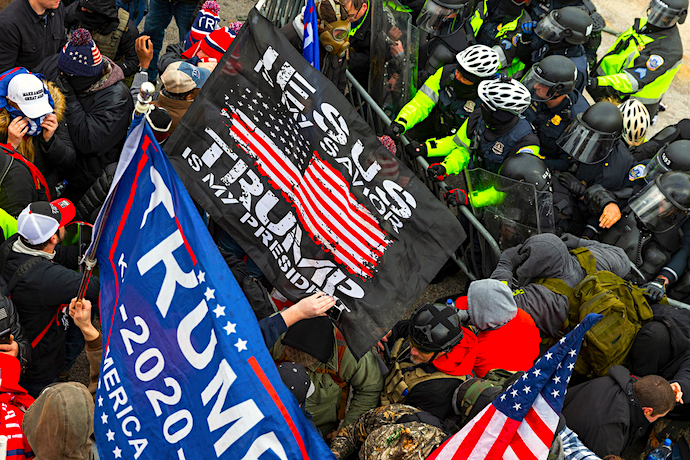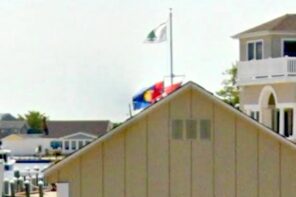Readers who follow my work will be aware of my conviction that neither the press, nor the American public generally, is taking the serious threat to democracy and human rights posed by the Christian Right seriously enough. It’s a concern I share with Andrew Seidel, a constitutional lawyer and the Freedom From Religion Foundation’s Director of Strategic Response. Commenting on the continuing danger of the theocratic threat a year after the January 6 insurrection, Seidel stressed to RD that it’s Christian nationalism that “created a moral permission structure that granted the insurrectionists a mental and moral license to attack our government and attempt to overthrow a free and fair election.”
In a nutshell, Christian nationalism is the ideology behind a theocratic movement of mostly white Christians who are motivated by the beliefs that America was founded as a Christian or “Judeo-Christian” country; that the nation has a special calling from God and will be blessed if its leaders are “obedient” to him–and they do mean “him.” For Christian nationalists, the suggestion that God could be referred to by any pronouns other than the masculine ones is a cause for outrage.
To them, making the nation “obedient” to God means putting right-wing Christians in charge, banning abortion, taking away LGBTQ rights, and putting prayer and the Bible in schools. Christian nationalists also tend to view contemporary political tensions in terms of “spiritual warfare,” seeing America as beset by “godless,” “satanic” forces such as liberals, “communists,” queer people, racial justice advocates, and “globalists” from whom “real Americans” have a sacred right and duty to “take the country back.”
Christian nationalism has been a consistent indicator of support for Donald Trump since 2015. It can also be found at the root of much of the political violence that’s racked the US since that time, up to and including the 1/6 insurrection itself.
According to several people intimately involved with the project, Seidel was the driving force behind the new report “Christian Nationalism and the January 6, 2021 Insurrection,” produced jointly by the Baptist Joint Committee for Religious Liberty and FFRF and released on February 9. The report features a variety of secular and Christian voices—including scholars, religious practitioners, and civil society advocates—who, each from their own disciplinary and religious or nonreligious perspectives, thoroughly document the history and present realities of Christian nationalism in the United States and strategize about how to combat it, a goal all the contributors see as urgent.
In a February 9 webinar for journalists and the interested public, Amanda Tyler, executive director of the BJC, set the tone by asserting that “combating and ultimately defeating Christian nationalism will take a broad coalition” consisting of both nonreligious people and religious people. She stressed that, while they may seem like unlikely partners, what unites the BJC and FFRF is their strong commitment to the separation of church and state.
Next, FFRF’s president Annie Laurie Gaylor spoke, calling the BJC “a treasured ally” in an encouraging display of pluralism in action. It’s long been my own position that coalitions across lines of faith and non-faith, centered on shared values rather than shared beliefs, will be critical in the fight for a pluralist, multiracial democratic future in the United States—a future opposed by the conservative, mostly white Christians who seek to impose minority authoritarian rule.
The webinar featured presentations by most of the report’s authors, who gave brief overviews of their contributions. Sociologists Andrew Whitehead and Samuel Perry stressed that, while Christian nationalism can and often does align with traditional measures of religious practice such as church attendance, once Christian nationalist beliefs are taken out of the equation, the practice of Christianity in the United States usually “is associated with pro-social attitudes and tolerance.”
Then, bestselling Christian author and speaker Jemar Tisby provided an overview of the history of African-American Christianity, holding it up as a model for how Christianity and patriotism can be linked in a way that promotes tolerance and democracy, in contrast to Christian nationalism. “White Christian nationalists,” said Tisby, “have an understanding of religion that leads them to a very racist, xenophobic expression.”
Next, Katherine Stewart, author of The Power Worshipers: The Dangerous Rise of Religious Nationalism, described the networks and top-down leadership and messaging structure of the Christian Right. Stewart was followed by Andrew Seidel, who described prior Christian nationalist events focused on the “big lie” of a 2020 election supposedly “stolen” from Donald Trump, particularly the November 14, 2020 “Million MAGA March” and the December 12, 2020 “Jericho March”—an event, Seidel emphasized, deliberately modeled on a biblical genocide—as “dry runs” for the January 6 insurrection, noting that both events were Christian nationalist and militant in tone; both involved many of the same actors who showed up on January 6; and both spilled over into street violence.
Amanda Tyler then made some closing remarks, stressing that the new report represents “the most complete accounting of Christian nationalism,” not only as present on January 6, 2021, but also with respect to “the events leading up to that day.” Though Anthea Butler, a professor of Religious Studies at the University of Pennsylvania, was unable to attend, her contribution to the report, which comes directly after the opening section outlining and defining Christian Nationalism, provides a historical overview of the role of white supremacy in the development of Christian nationalism.
The report is essential reading for those concerned about America’s epidemic of violent authoritarianism and looking for ways to defeat it. According to Seidel and Tyler, the initiative to work together on the project derived from a March 23, 2021 event in which both of them, representing their respective organizations, presented information on the connections between Christian nationalism and January 6 to the Congressional Freethought Caucus. Impressed by Tyler’s deep commitment, as a Christian, to the separation of church and state, Seidel, an outspoken atheist, suggested that they work to bring critics of Christian nationalism together in a conversation that ultimately led to the production of the new report.
In an interview with RD, Seidel described the March 23 event as the beginning of a “fruitful relationship” with Tyler, adding that the BJC had been “great to work with.” He noted that, while the BJC and FFRF may be unlikely allies, “Christian nationalism is such an existential threat to the country that it brought us together to oppose it.”
In an interview with RD, Tyler noted that the BJC has been focused on calling out Christian nationalism consistently since 2019, when the BJC launched its “Christians Against Christian Nationalism” initiative. “When we launched it,” says Tyler, “the centerpiece was the statement of unifying principles,” a matter that can be tricky when the goal is to create a united front among Christians from a variety of backgrounds who disagree on numerous matters of theology and politics.
The preamble to the statement calls Christian nationalism “a persistent threat to both our religious communities and our democracy” and describes the merging of American and Christian identities as “distorting both the Christian faith and America’s constitutional democracy.” Among the 8 principles, signers are asked to affirm their belief that:
- Government should not prefer one religion over another or religion over nonreligion;
- Conflating religious authority with political authority is idolatrous and often leads to oppression of minority and other marginalized groups as well as the spiritual impoverishment of religion; and
- We must stand up to and speak out against Christian nationalism, especially when it inspires acts of violence and intimidation—including vandalism, bomb threats, arson, hate crimes, and attacks on houses of worship—against religious communities at home and abroad.
The statement has garnered over 24,000 individual open signers from more than six dozen denominations, and the BJC’s work on what has become a successful grassroots initiative has shifted to creating and providing educational resources, including a curriculum and a podcast series, to help members of local communities become informed and involved in confronting Christian nationalism in their own social milieus. People in local communities, reasons Tyler, have the best opportunities to influence their immediate political representatives, to help them understand that it is not anti-Christian to oppose Christian nationalist initiatives.
“We think you make a difference in Christian nationalism conversation by conversation, relationship by relationship,” Tyler explains. This means that having materials available that criticize the phenomenon from a normative Christian perspective, materials “that would resonate in Christian communities,” as Tyler puts it, is essential. But does this risk promoting the notion that Christian nationalists—along with authoritarian Christians in general—aren’t “real” Christians, a framing that I’ve criticized on many occasions as upholding Christian hegemony by implicitly equating “Christian” with “good”?
Asked about the relationship between Christianity and Christian nationalism, Tyler is thoughtful. “Christian nationalism is not a religion,” she says. But, she adds, “I’ve heard people say ‘[Christian nationalism] has nothing to do with Christianity,’ and you have to reject that.”
Noting that the impulse to combine Christianity with state power dates back to the Roman Emperor Constantine, Tyler also readily admits that in some communities “Christian nationalism has so infiltrated the religion that you can’t tell the difference between the two.”
Thus, while combating Christian nationalism on Christian theological grounds, Tyler does not deny that practicing Christians can be Christian nationalists. “Being a white Christian in this country means having benefited from Christian nationalism in ways we often don’t recognize,” Tyler acknowledges. She sees the Christians brought together by the BJC to confront Christian nationalism as “willing to be self-critical” and “willing to learn more about how Christian nationalism has impacted their congregations, their communities.”
Asked whether she’s concerned that the American public may be losing interest in the threat of Christian nationalism and its connection with the January 6 insurrection, Tyler says she was encouraged by the degree of interest in the February 9 webinar, for which 1500 people registered, 800 of whom attended. These are very large numbers for events of this nature, and part of the reason for releasing the report at this time is to “keep public attention on Christian nationalism.”
While no particular next steps are immediately planned, Tyler expresses hope “that this will be a resource for the [US House Select Committee on the January 6 Attack], and for others who are looking into January 6, to do some fact-finding.” She also expressed hope that the report would help the general public to see “how dire this threat is.”
Seidel, too, stresses how serious and immediate the threat is, and his sense of urgency clearly derives from his meticulous work documenting the connections between Christian nationalism and the violence both prior to, and during, January 6, research he describes both in a new epilogue to the paperback edition of his book The Founding Myth: Why Christian Nationalism is Un-American, as well as in the new report.
As Seidel put it during the February 9 webinar: “America is a shared idea. And Christian nationalism refuses to share. It excludes non-Christians and the wrong kind of Christians, as this report shows…. This is the choice we face as a nation: Christian nationalism or America? We cannot have both.”





